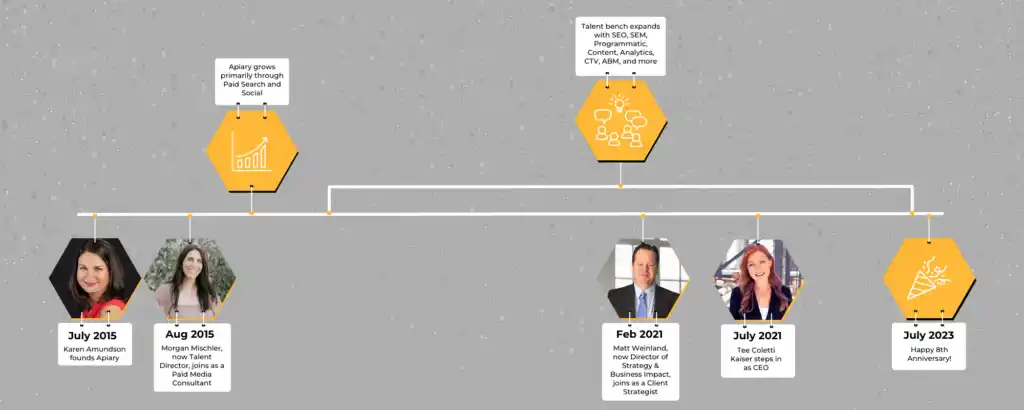
This month, Apiary turns 8 years old! Woo!
The seed of the idea that birthed our Collective was planted while our founder, Karen Amundson, was trekking through the rice fields of Bangladesh. Her main questions:
- How can we better leverage high performers who don’t want full-time or traditional agency roles?
- Doesn’t it make sense that centering human well-being will invariably produce business well-being?
Karen invested 6 years at the helm of our unique business model, and then in July 2021, Tee Coletti Kaiser stepped into the CEO spot to champion an even more powerful Apiary Hive.
In just two short years, Tee’s leadership has nearly doubled the size of our talent bench of senior marketing experts – over 130 consultant-partners deployed on projects today.
We’ve grown a ton, but one thing will never change…

Headquartered in the Cloud from Day One to Forever
Long before shutdowns and Zoom, Apiary was 100% remote and we’re (borderline fanatical about) staying that way.
We believe remote work is one of the best mechanisms for helping humans live their story, which benefits the humans providing the work product and the brands who use it to grow.
For us, there are three angles to consider when examining the benefits of working remotely.
- Why is this better for consultants?
- Why is this better for clients?
- Why is this better for the organization itself?
Let’s explore all three.
Benefits of Remote Work for Consultants
Inclusion and accessibility
Traditional in-office work environments are often not inclusive or accessible spaces. In some cases, the organizational infrastructure is blatantly biased. In others, the structure appears to be egalitarian but unofficial office culture norms create an unwelcoming environment for:
- Disabled and neurodivergent people
- Non-native English speakers
- LGBTQIA people
- Black, brown, and indigenous people.
Remote work, on the other hand, allows talent to offer their skills to the marketplace within a context that aligns with their values and psychological comfort.
Additionally, when people with chronic illnesses can work remotely, they’re able to customize their work space and schedule to support whatever accommodations they need to perform well.

The Apiary Inclusive Marketing Guide Performance marketing = inclusive marketing. Check out our comprehensive guide to learn more!
Location agnostic
The rural population of the United States increased to 20% in 2020, and this number has only continued to climb since the COVID pandemic.
Remote work allows high performers in rural communities to engage in fulfilling work without spending more time on their commute than on their actual work.
Working remotely is also ideal for people who prefer a more nomadic or travel-heavy lifestyle (like our Paid Social subject matter expert, Miguel Bravo). Wherever there’s wifi, work can happen.

Meet Miguel Bravo: Apiary Consultant-Partner Case Study “I first wanted the flexibility to travel the globe without skipping a beat on client work. Now it’s about spending time with my daughter.”
Schedule autonomy
- Maybe you like to wake up before the sun and bang out two hours of work before stepping away for three hours of school drop off and morning yoga.
- Maybe you enjoy working mostly on the weekends so your weekdays are lighter.
- Maybe you’d love to work part time for 6 months and then take 6 months off to travel.
Declaring any of these scenarios as “wrong” is the old worldview; the one where humans are mischievous puppies who need to be contained and monitored at all times.
Remote work lets people design a work schedule that supports their well-being, which can only be defined on an individual basis, by the individual.
And when top performers are actively supported to align work hours and well-being, that only lubricates the quality and effectiveness of the service they deliver.
Fewer work-related expenses
Working in a physical office carries ancillary costs, whereas remote jobs tend to come with cost savings.
- Commuting and/or public transit expenses
- Cost of buying a wardrobe of “work clothes”
- Cost of pet day care or walking services
- Workplace social events that involve additional logistics and expenses
On a related note of relevance for sober individuals…
Multiple consultant-partners have shared that they first gravitated toward remote work because it removed them from the expectation of attending networking events, conferences, and weekly happy hours with colleagues who viewed drinking as a mandatory ‘team building’ exercise.
Wider and better access to opportunities
In years past, if a career-advancing role became available across the country but did not offer a relocation stipend, many qualified candidates could not apply. Remote work opens up opportunities across the country and globe.
Environmental benefits
KPMG has estimated that with the rise in the number of people working from home post-pandemic, vehicle commuting will be reduced by 70-140 billion miles per year. We’re not climate scientists, but that sounds like a whole lot less greenhouse gas emissions.
Other environmental implications of working remotely from home instead of commuting into a physical office environment:
- Less traffic congestion
- Improved air quality due to the reduction in vehicle emissions
- Reduced electricity and water consumption
- Conservation of natural resources by reducing the need for new construction or expansion of existing office infrastructure.
Benefits of Remote Work for Organizations
Okay, okay. A significant portion of the talent market really loves remote work. You get it. But is it an equally attractive proposition for the employer/organization?
FUN FACT: Apiary Digital has one employee - our Chief Executive Officer. Every other member of our Collective is an independent contractor.
Here are 5 reasons why remote work can substantially benefit your company/organization:
Reduced overhead costs
What becomes possible when a company’s total operating costs are slashed by 30-50%? Removing the overhead expenses associated with maintaining a physical office lets companies answer that question however they like.
As a 100% remote organization, Apiary’s balance sheet includes absolutely NONE of the following expenses:
- Rent or lease payments for office space
- Utilities – electricity, water, and internet services
- Salaries for operations staff – reception, janitorial, building services, etc
- Office supplies and equipment
- Maintenance and repairs of office equipment and facilities
- Relocation stipends
Larger talent pool
Above, we shared that one of the benefits for talent is that remote employees and independent consultants can consider location-independent opportunities. Inversely, this is an advantage for companies, too.
Remote work lets brands access A+ talent wherever they are, instead of being constrained by who’s local or has the disposable income to relocate themselves and their family for the role.
Better talent is its own benefit, but when you give better talent the freedom and flexibility of remote work, you also get…
Increased productivity
Stanford did a two-year study showing that telecommuters (aka: remote workers) experience an uptick in productivity that’s equivalent to one additional day’s worth of work per week, when compared to in-office colleagues. A whole extra day.
This is another permutation of our “Let humans live their story” mission statement.
Almost every conversation we have with client-partners is about marketing performance optimization. Remote work facilitates human performance optimization, which then drives bottom line performance.
When top talent has autonomy over where, how, and when they work, everyone wins. Fueling humans fuels business.
Higher talent satisfaction and retention
Of course, remote work is not universally beloved. Different strokes n’ all that… However, a significant portion of the talent market does love it.
The third edition of McKinsey’s American Opportunity Survey found that a lack of flexible work options is one of the top 3 motivators for Americans to start looking for work elsewhere.
Companies who reject remote work are invariably pushing a portion of their workforce out the door.

Crisis future-proofing
Global pandemic? Natural disaster? We’re ready.
Remote-centric environments are equipped to return to regular operations long before organizations that depend on in-office attendance.
Benefits of remote work for clients
We’ve established that working remotely is better for many consultants and organizations, but when you’re a service-based business like we are, we have to ask whether it’s also better for the clients we serve. So, is it?
The short answer: Beyond a shadow of a doubt.
Happier, more engaged humans produce higher quality deliverables
In most conventional marketing agencies, the sales team hands over a client and the delivery team gets going. Questions like the following are rarely asked:
- Does this project excite you (beyond the financial compensation associated with it)?
- Does the speed and volume of client expectations work with your personal life?
- For any reason, would you prefer to skip this project and try another one?
In a talent Collective model like ours, consultant-partners are never assigned projects. They’re invited to join a team and always have the zero-guilt option of declining.
As a result, every Apiary team is a collection of humans who WANT to work with that respective client-partner, versus being required to. Truly engaged expertise beats every other kind.
Decision-making speed and responsiveness
Remote work often enables faster decision-making. When a curated stack of communication and collaboration tools is coupled with a company culture that honors flexible schedules, the “We need a meeting for that” refrain is no longer the only option.
Remote teams are known to produce faster turnaround times, streamlined decision-making, and the agility that supports quick pivots in the face of market fluctuations.
Expand or contract resources, as needed
A 100% remote workforce offers more flexibility when scaling your team. Onboarding and handovers are often much faster when reliance on physical offices is removed.
And *humble brag moment* with a remote talent bench as large as ours, it’s even easier for client-partners to flex up or down as their business priorities shift from one quarter to the next.
This is a much more nimble approach to growth.
How to Solve The Biggest Challenges of Remote Work
Is remote work perfection in all cases? Clearly, no. However…
Maybe it’s because we’ve been remote from the very beginning so we’ve honed our virtual skills better than most, but in our opinion, the most common critiques of remote work often ignore their associated solutions.
Critique #1: Remote communication is disjointed
This is 100% a systems and processes issue, not a categorical failure of remote work itself.
With integrated communications systems, role clarity, and regular systems audits, remote work can actually support more streamlined communication.
Critique #2: Team bonding can only be done in person.
This one’s a straight up myth. A warm, connected culture absolutely can be built virtually as long as leadership is intentional about why, what, when, and how.
- High-touch and accessible leadership
- Clear communication channels that facilitate a mix of “formal” and casual conversations
- Regular team check-ins
- Internal comms calendar that fosters a sense of purpose and shared values
- Events to celebrate key milestones and achievements (like our internal Slack “Watercooler” where we’re celebrating this 8th anniversary with virtual confetti galore)
Critique #3: Remote work encourages overworking
When working from home or the comfort of your favorite coffee shop, many people continue to work beyond the cutoff time they’d otherwise follow when working in a physical office. This is true. But a conscientious team culture goes a long way in alleviating this.
Celebrating non-work activities, overtly prioritizing holidays, weekends, and weeknights, and only contacting people on vacation for true emergencies, are some of the ways we achieve this.
This is also why *one more humble brag* Apiary instituted our highly unusual vacation coverage policy.
In most consultant or freelance collectives, going on vacation often means losing your spot on a project team. Understandably, this discourages people from taking time off, which everyone’s mental health requires, so…
Thanks to the depth of our talent bench, consultant-partners can tap a colleague for coverage while they take time away from work (for any length of time), and tap back into the project when they return. Job security for freelance, independent consultants? Why yes, thank you.
Like we keep saying: What’s good for humans is good for business.
Happy 8th Anniversary, Apiary! Here’s to the next 8!



